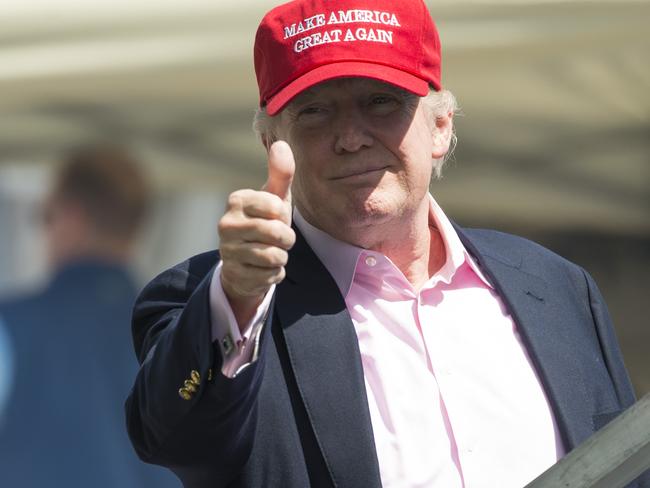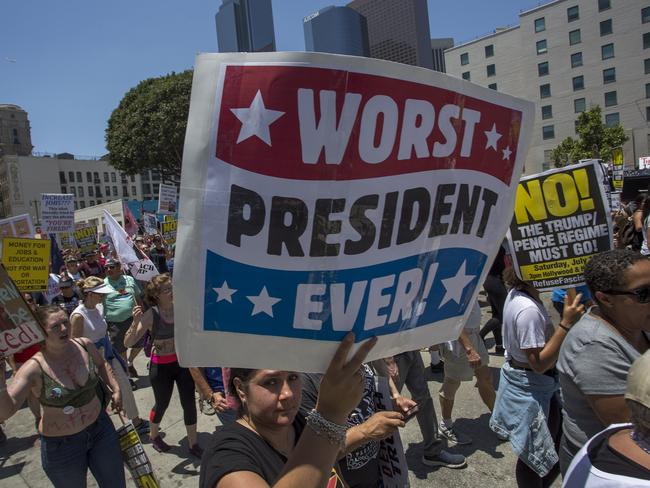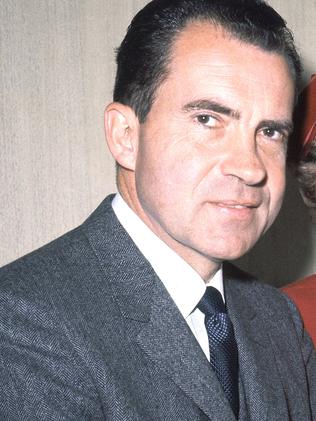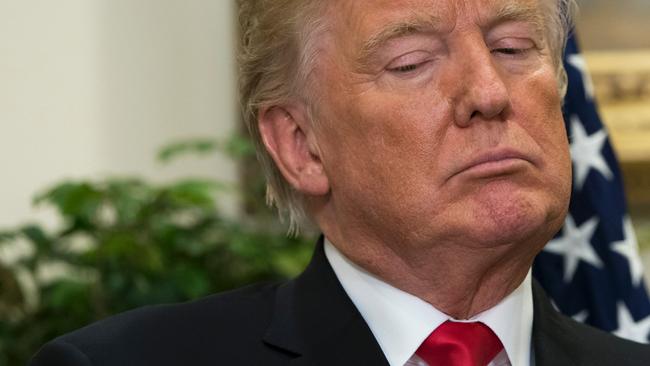Donald Trump impeachment process: How would it work, how long would it take?
DONALD Trump has been in power for six months, but a new report suggests his presidency is on the brink of disaster.
DONALD Trump has been in power for six months today, and remains America’s most unpopular president in 70 years.
A new analysis by CNN’s political editor-at-large, Chris Cillizza, warns that Mr Trump’s presidency is on the brink of disaster.
Mr Trump has “lurched from controversy to controversy and now appears to be on the verge of tilting directly into the political abyss”, Mr Cillizza writes, highlighting the President’s low approval ratings, lack of legislative accomplishments and, of course, the lingering questions about his relationship with Russia.
Former FBI director Robert Mueller is leading an investigation into potential collusion between Russia and Mr Trump’s presidential campaign, and potential obstruction of justice by Mr Trump himself.

Mr Cillizza acknowledges anything is possible — Mr Trump’s election victory is proof of that — but says: “After six months of ‘Trump the President’, the likeliest outcome seems to be a slip into the political abyss. Believe me. Bigly.”
His warning comes on the heels of a new poll, which shows a higher percentage of Americans support Mr Trump’s impeachment now than approved of Richard Nixon’s impeachment at the height of the Watergate scandal.
A Monmouth poll found 41 per cent of Americans think Mr Trump “should be impeached and compelled to leave the presidency”, compared with 24 per cent who supported Mr Nixon’s impeachment, CNBC reports.
Be that as it may, we’ve been hearing dire predictions about Mr Trump’s presidency for months now — and the reality is, removing any president from office is extremely difficult.

THE IMPEACHMENT MYTH
An analysis of the impeachment process — I mpeachment 101: The history, process and prospect of a Trump impeachment, written by US Studies Centre CEO Professor Simon Jackman — has revealed it’s actually a lot harder than most people realise.
As he points out, impeachment “has a scarce and staggered history in American history”. It’s also a complex process.
There are two steps. First, the US House of Representatives has to pass articles of impeachment with a basic majority. Then the president faces a trial in the Senate. If two thirds of the senators vote to convict him, he is removed from office.
Prof Jackman predicts Mr Trump likely won’t face that fate, based on this reasoning:
1. No president has ever been kicked out of office
The spectre of impeachment has only been raised three times before — against Andrew Johson in 1868, Richard Nixon in the 1970s and Bill Clinton in the 1990s.
Having seen the writing on the wall, Mr Nixon resigned amid the Watergate scandal in 1974 before his impeachment could be carried out. The other two presidents faced impeachment trials, but were not convicted.
The upshot? Impeachment is extremely rare, and no president has ever been turfed out.
“Resignation or death remain the only ways US presidents have left office prior to electoral defeat or term limits,” Prof Jackman says.


2. Impeachment is not a legal process — it’s a political one
“Critically, criminal acts are neither necessary not sufficient for impeachment and conviction of a president,” Prof Jackman says.
This is a key point that is often forgotten. Impeachment is not a legal mechanism — it can be carried out when the president hasn’t technically committed a crime, and on the flip side, the commission of a crime does not guarantee impeachment.
Only one question matters — do America’s politicians have the political will to remove the president from office? If the answer is no, it doesn’t matter what the man in the White House has done wrong.
3. Republicans still like and support Trump
This is related to the previous point. Polls show Mr Trump is still extremely popular in his own party, with more than 80 per cent of Republicans approving of his performance. That is particularly important because the Republicans currently control both the House of Representatives and the Senate.
The politicians in Congress are not going to impeach a president against their own voters’ wishes. Until Mr Trump’s support nosedives among Republican voters, he is safe.
We’ve seen that situation unfold before.
“Clinton was impeached with Republican majorities in the House of Representatives and the Senate, but with near universal opposition to impeachment among Democratic House members. No Democratic senator voted for Clinton’s conviction in the Senate,” Prof Jackman says.
How would the numbers look for Mr Trump? Good. Very good, in fact.
“Even if an impeachment vote could get to the floor of the House of Representatives and all of the 193 Democrats in the House voted for impeachment, at least 25 Republicans would have to vote for impeachment too,” Prof Jackman points out.
“Then, if all 46 Senate Democrats and two independent senators voted for conviction, 19 Republican senators would need to support conviction for Trump to be removed from office.”
So, don’t expect an impeachment effort to succeed before the 2018 midterm elections, when the Democrats could take back control of Congress.

4. Mueller’s investigation won’t necessarily doom Trump
Robert Mueller, a former FBI director, is the special counsel overseeing an investigation into alleged ties between Mr Trump’s campaign and Russia.
So much of what we know about the Russia controversy, including the fateful meeting between Donald Trump Jr and a Russian lawyer, has come from media reports. We have very little idea what Mr Mueller’s investigation has found, or will find.
It may find no evidence of wrongdoing from Mr Trump. It may uncover crimes committed by people in Mr Trump’s orbit, without implicating the president himself. We simply do not know where the evidence will lead.
“Special Counsel Mueller has less investigative scope and autonomy than did Kenneth Starr, who served as independent counsel investigating a series of allegations against the Clintons,” Prof Jackman says.
5. Trump would probably resign first
Mr Trump can’t be turfed out of office if he quits first.
“A president who thought it was likely that two-thirds of the Senate would vote for conviction would resign prior to impeachment or trial, perhaps even trading the timing and manner of their resignation for a presidential pardon from their successor, protecting them against criminal prosecution,” Prof Jackman writes.
Call this the Nixon model. Faced with the prospect of being kicked out via impeachment, Mr Nixon chose to go out on his own terms. Prof Jackman argues Mr Trump would probably do the same.



